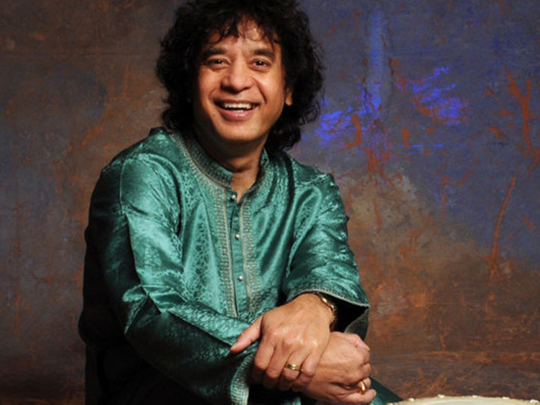
He started playing professionally at the age of 12. That technically means, at 63, Indian tabla maestro Zakir Hussain has been performing for more than 50 years.
You’d think he’d have days when he just wants to hang up his boots.
“Not at all,” says the Grammy-winning musician. “One thing about this art form is that it’s a great stimulus. It’s such a great discipline that it never becomes monotonous. There’s always something new around the corner… a new venue to play at… new collaborators… And that curiosity keeps you going.”
For his UAE return this weekend, at the Dubai World Trade Centre on January 31, Hussain will lead a fusion concert featuring Celtic folk musicians performing alongside other masters of Indian classical music. Called Nirvana 2015: An Indo-Celt Fusion, the performance was written by Hussain for a pre-2012 Olympics concert in London, and this will be the first time it has been performed in the Middle East.
“We are going to have a very interesting melodic and rhythmic conversation,” he says. “The Celtic music tradition has existed for more than 200 years and what I’ve done is fused that with Indian classical music. The instruments are actually very similar. For instance, the shehnai [an aerophone] blends with the bagpipe, the Celtic musicians use flute, and I have Rakesh Chaurasia playing the flute, there is the bodhran (an Irish frame drum) and we have the dhol (Indian drum). So it’s going to be a nice blend.”
The son of legendary Indian tabla player Alla Rakha, Hussain started early and began professionally touring with his father at the age of 12. Today, he is considered a national treasure in India and a leading light in World Music, having performed with many top artists from George Harrison and Van Morrison to Yo Yo Ma, and the who’s who of Indian classical music: from Ravi Shankar and Shivkumar Sharma to Hariprasad Chaurasia. In fact, it was his collaboration with Grateful Dead drummer Mickey Hart, for the album Planet Drum, which won him his first Grammy for Best World Music Album in 1991, the first time the award was ever given. He’s won numerous awards over the years, including more Grammies and the Padma Shri and Padma Bhushan, given to civilians of merit by the Indian government.
Collaborations are more than just the ability to blend instruments on stage, he says.
“For me, the first layer of interaction is on a social level. You get to know a person and if you are on the same wavelength and vibing well with each other that way, the rest becomes that much easier,” he says. “What is music or art? It’s just an extension of your off-stage persona. You’re sitting there, you’re discussing so many other things that tune you into each other’s life and you’re sharing all those experiences. Only then can that relationship comes across on stage.”
On stage, there are often no set lists, he adds.
“When you grow up learning a discipline like Indian classical music, or even jazz, they are disciplines that rely a lot on spontaneous creativity. When you learn the music, you learn how to be spontaneous and how to be instinctive and creative at the drop of a hat,” he says.
‘Audiences have evolved greatly’
“Yes, there might be a pre-determined programme laid out. But that programme will not be enforced on the audience’s journey from Point A to Point B. It will allow us to be fluid and feed off their reaction so there’s a lot of freshness. “
Audiences around the world have evolved greatly says Hussain, mostly thanks to the internet.
“They are very different from audiences 30 years ago. Today they have the opportunity to arrive to a concert more well-informed. They can Google, YouTube you and they know your abilities and look forward to sharing that opportunity. So whether its Chicago or Paris or Amsterdam, there is that familiarity.”
The internet has also opened a whole new world for aspiring musicians, he says. Something they couldn’t do before.
“It’s made it much easier for the artist to be more in control of his music,” he says. “In the olden days, the record company had the power. They promoted it the way they wanted it.
“Now you can record your work right in your living room, post it on the internet and have the control over what you want to call it. So yes, in that sense the internet has made it possible for artists to be more hands-on. And that’s the great thing about it.”
Hussain, who says he spends 200 days of the year in airports and hotels around the world, splits his time between his ancestral home in Mumbai and San Francisco, where he lives with his wife Antonia and two daughters, Anisa and Isabella.
“I spend a major part of the year in San Francisco and Mumbai is like my winter home,” he says. “But preparations for my yearly homage to my father in Mumbai are in full swing. In fact the same band that’s playing in Dubai will perform there.” Every year, Hussain organises a massive concert on February 3, on his father’s death anniversary, considered the cultural event of the year in the city.
Following the Dubai performance will be the release of the SF Jazz Sessions DVD, filmed across four days in San Francisco, and he wants to finish a concerto he’s writing for the Symphony Orchestra of India. Then, it’s wherever the music will take him.
And he hasn’t been afraid to experiment: from Hollywood film soundtracks to Bollywood music and even acting. His last acting role was in Saaz, the 1998 Bollywood film about two singing sisters who become bitter rivals.
“Music is my life. So I’m up for doing anything related to music or on the periphery,” he says.











